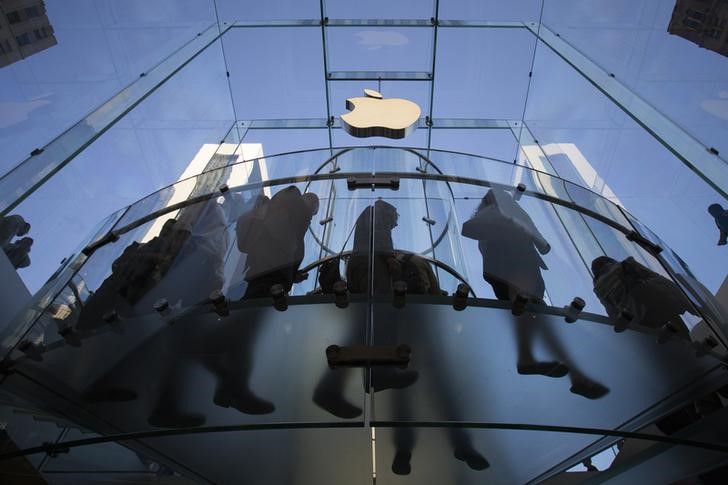As the first-quarter earnings season draws near, the spotlight is on the "Magnificent Seven" and other major tech players as they gear up to unveil their quarterly EPS.
The upcoming earnings reports of these industry juggernauts are highly anticipated. Investors and analysts are eagerly awaiting these reports, hoping to gain valuable insights into the financial health and growth trajectories of these influential companies.
Earnings Calendar Dates for Big Tech Stocks
Starting with the magnificent seven, Apple (NASDAQ:AAPL) will report on May 2, Microsoft (NASDAQ:MSFT), Meta Platforms (NASDAQ:META) and Google on April 23, Amazon (NASDAQ:AMZN) on April 25, Nvidia (NASDAQ:NVDA) on May 22, and Tesla (NASDAQ:TSLA) on April 23.
Meanwhile, other tech names, such as Netflix (NASDAQ:NFLX), will report on April 18, AMD (NASDAQ:AMD) on April 30, Salesforce (NYSE:CRM) on May 28, and Taiwan Semiconductor Manufacturing (NYSE:TSM) on April 18.
Long or Short on Big Tech? What Analysts Are Saying
Analysts at UBS said in a note this week that the technology sector is still dominant, but it is forecasted to decelerate.
“This reporting season, investors will be focused on the breadth of corporate profits vs. strength in the largest TECH+ stocks,” said the bank. “Big 6 EPS growth peaked in 4Q23 at 68.2% and is expected to grow 42.1% in 1Q24. Earnings estimates have been revised higher by 6.2% for the Big 6 YTD, vs. -1.9% for the rest of TECH+, and -5.3% for the rest of the market.”
Meanwhile, JPMorgan (NYSE:JPM) described big tech earnings as “the most important next catalyst for the Market.”
They add that it is hard to argue that magnificent six (the magnificent seven, minus Tesla) isn’t well held across both specialists and generalists, but ”there has been a creeping desire to rotate into 2nd, 3rd, 4th derivative plays on AI in recent weeks and to play for a catch up in the Equal-Weighted S&P.”
However, JPMorgan disagrees with these trades. The firm’s analyst said the tape feels similar to the mid-2020 period, during which macro was incredibly spotty, mega-cap tech offered rare defensive growth, and the magnificent six was +60% through the second quarter and third quarter of 2020 compared to the S&P 500 at +30%.
Will AI Stocks Boom or Bust?
When it comes to artificial intelligence stocks, JPMorgan said investors have “ultimately chosen to reward revisions this year which has been fairly exclusively in semis, hardware, and anything else exposed to the data centre build out phase (pockets of industrials, energy, REITs).”
“In Mag6, NVDA/META has already seen massive AI-linked upgrades,” they added, noting that AI has “extensively underpinned” the growth duration at Microsoft and Amazon. In addition, they think Alphabet (NASDAQ:GOOGL) and Apple have all the tools to use AI to keep winning.
Which Technology Stocks Should Investors Buy Next?
When it comes to stocks investors should look into, analysts at Deutsche Bank (ETR:DBKGn) recently highlighted CSCO as a potential near-term winner, naming it a catalyst call idea in a recent note.
The bank stated that they view Cisco (NASDAQ:CSCO)'s upcoming Investor Day on 6/4 as the primary catalyst, with the company likely to provide refreshed long-term targets while spotlighting its improved scale/platform value, alongside potential updates on AI targets/customer demand.
Elsewhere, Goldman Sachs (NYSE:GS) said ASML (AS:ASML) has a favorable risk/reward skew driven by AI tailwinds. “We continue to see an attractive 2x risk-reward profile for the shares, with +49%/-26% upside/downside in our bull/bear case scenarios respectively,” said the investment bank.
Last week, Wedbush analysts said Amazon and Netflix are “positioned for accelerating growth” due to a growing trend towards increased programmatic ad buying. This could lead to more optimized advertising campaigns and improvements in measurement techniques, all of which are forecasted to sustain expansion in this sector.
The firm believes Amazon and Netflix are poised to capitalize on these trends. “Netflix’s CPMs and ad delivery rates have remained consistent at around $40 and at four ads per hour, respectively, and will likely remain consistent throughout 2024, aside from a seasonal rise in CPMs in 2H:24,” said the firm.
Amazon is seen as one of the primary candidates to capture a larger portion of the CTV advertising market “given the company’s leading first-party data and ability to deliver insights to advertisers to inform targeting and measurement.”
